The Gulf crisis entered a new phase last week, when Saudi Arabia and its allies made 13 demands of Qatar in order for the blockade against it to be lifted. The list included closing Turkey’s military base in Qatar and ending support for vaguely defined “terrorist groups,” as well as for the Muslim Brotherhood.
The crisis itself—and in particular these demands—are deeply disturbing for Turkey. Not only had Turkey’s offer to mediate the conflict been snubbed, but Saudi Arabia is now challenging its close relations with Qatar and its deployment of Turkish troops to the country. Additionally, Riyadh did not welcome Ankara’s offer to set up another base in Saudi Arabia—as a sign of its friendly intentions and investment in regional security.
Turkey appears stuck, on the one hand, with a policy that commentators have long defined as “zero neighbors without problems”—a policy closely associated with the post-Arab Spring “imperial fantasy” of Ahmet Davutoğlu (former prime minister and minister of foreign affairs), aspiring to exercise influence over the Muslim Middle East. On the other, there’s “realpolitik,” dictated by the interests of nation-states.
How did Turkey’s relations with the Gulf get this way?
The roller coaster of Turkish foreign policy
Davutoğlu had once been closely associated with Turkey’s “zero problems with neighbors” policy. This policy had emerged in the early years of the Justice and Development Party (AKP)’s tenure in power, when Turkey markedly improved its relations with its neighbors, embarked on EU accession negotiations, and expanded economic integration with its neighborhood. In 2007, Turkey hosted Mahmud Abbas and Shimon Peres and arranged for both leaders to address the national parliament. Ankara ran mediation efforts around the region, including proximity talks between Israel and Syria. No wonder The Economist—less than seven years ago—called Turkey’s government, and especially Davutoğlu, “the great mediator.” It was in this context that Turkey was elected by a wide margin to a non-permanent member seat on the U.N. Security Council in 2007. Turkey hadn’t held such a seat since 1961.
The picture today is a very different one. It is characterized by the ever-increasing disputes that Turkey is having with countries in its neighborhood and beyond. Domestic political problems and growing authoritarianism have tarnished its “soft power,” which had once made it a model for many Muslim countries aspiring for dynamic economies and democratic political systems. The U-turn in Turkish foreign policy—and the resulting loss of prestige—has come at a cost: Turkey lost its bid for another round of U.N. Security Council non-permanent membership in 2014, by a vote of 132 to 60 (in favor of Spain). In 2007, Turkey had won 151 of the 193 votes. Although the votes are secret, it would not be surprising if a number of Arab countries—including those involved in the Qatar crisis—voted against Turkey this time. Why?
The turnabout from “zero problems with neighbors” to “zero neighbors without problems” came in the aftermath of the Arab Spring. Davutoğlu saw the popular uprisings as the opening of a new era in the Middle East that would see the emergence of elected governments led by the Muslim Brotherhood. He envisaged the birth of a “Muslim Brotherhood belt,” under the influence of Turkey, from Tunisia, Libya, and Egypt to Syria. In a 2013 speech in Diyarbakır, he called this process “grand restoration,” saying the uprisings would provide an opportunity for Turkey to shape the “flow of history” and close the bracket on the time when the Middle East faced a Western-imposed, nation-state-based order. He saw nationalism as an alien force to Islam, planted by Western powers to break up the unity of the Muslim ummah (community). He expected that as repressive regimes fell in Tunisia, Libya, and Egypt, Assad would imminently depart power in Syria. Turkey, as a “central and order-setting country”—two concepts closely associated with Davutoğlu’s foreign policy thinking—would lead this “grand restoration.”
Change of plan
Realpolitik then rudely interrupted. Libya disintegrated into chaos. Rached Ghannouchi avoided falling into the trap of majoritarianism and instead pushed his Ennahda party, Tunisia’s Muslim Brotherhood analogue, to cooperate with secular parties. The popularly elected government of Mohammed Morsi in Egypt was violently overthrown by a military coup, and Ankara wholeheartedly adopted his cause. Syria became engulfed in civil war and proxy wars while massive destruction and displacement ensued.
In an effort to bring about regime change in Syria, Turkey sided with Qatar and Saudi Arabia against Assad and his allies Iraq, Iran, and Russia. The days of Davutoğlu’s Diyarbakır talk were long gone, and he eventually resigned in May 2016. The new prime minister, Binali Yıldırım, announced that Turkey would seek to “increase the number of our friends” and “decrease the number of our enemies.” This pragmatic policy promptly translated into reconciling with Russia and Israel, as well as succumbing to a new reality in Syria, imposed by Russia. It replaced regime change with militarily preventing a separate Kurdish entity emerging along its border with Syria. Reality began to trump ideological preferences.
Ankara’s choices
However, Turkey’s response to the Qatar crisis demonstrates the limits of pragmatism and realpolitik. Davutoğlu’s legacy is clearly still alive, and helps explain Turkey’s decision to throw its weight behind Qatar—the two share ideological ties (in defending the cause of political Islam), though realpolitik considerations in the form of projecting power and “showing the flag” in an increasingly contested Middle East are also at play. At this point, it is difficult to say how far Turkey would be prepared to stand its ground.
Pro-government media has been espousing support for Qatar’s cause. Ekmelettin İhsanoğlu, on the other hand—a member of parliament from the opposition National Action Party (MHP) and previously the secretary general of the Organization of Islamic Cooperation—has called for Turkey to return to its traditional republican foreign policy: Rather than meddle in disputes among Arab countries, Turkey should adopt principled neutrality, he argues. He pointed to the advice of Turkey’s founding fathers—including Atatürk himself—but such an approach also aligns with the AKP’s original “zero problems with neighbors” policy. That policy brought Turkey considerable prestige and influence, as well as a capacity to mediate conflicts. Insisting on a foreign policy agenda driven by a mixture of ideological consideration and misconstrued realpolitik, in contrast, is likely to fuel the “zero neighbors without problems” reality and is neither likely to contribute to resolving the region’s challenges nor enhance Turkey’s influence.
The time has come to put to rest Davutoğlu’s “grand restoration” project, recognizing that the Arab Spring largely failed to bring about democracy and accountable governance in the region under the Muslim Brotherhood. Ankara should instead strive for Binali Yıldırım’s goal of increasing friends and reducing enemies.
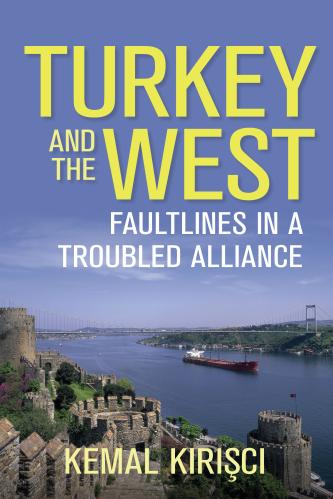
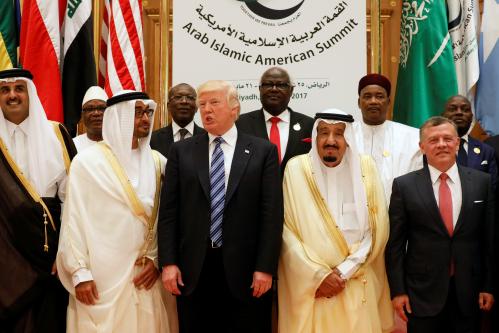
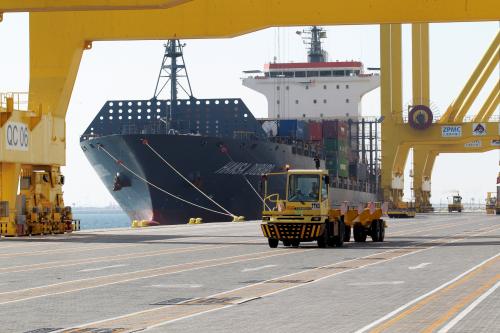
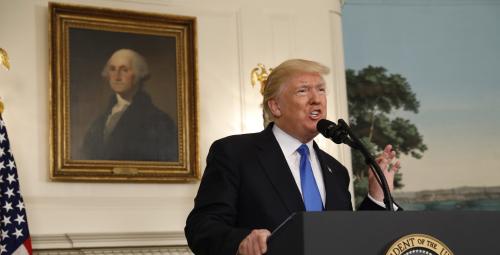

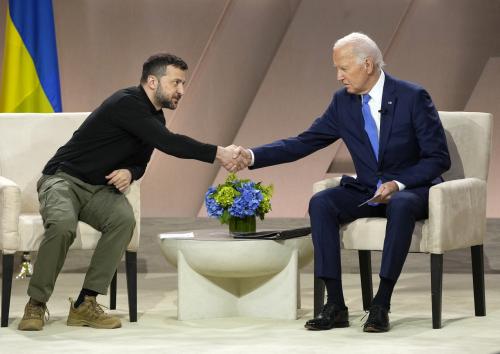

Commentary
How the Gulf crisis forces fundamental choices in Turkish foreign policy
June 28, 2017